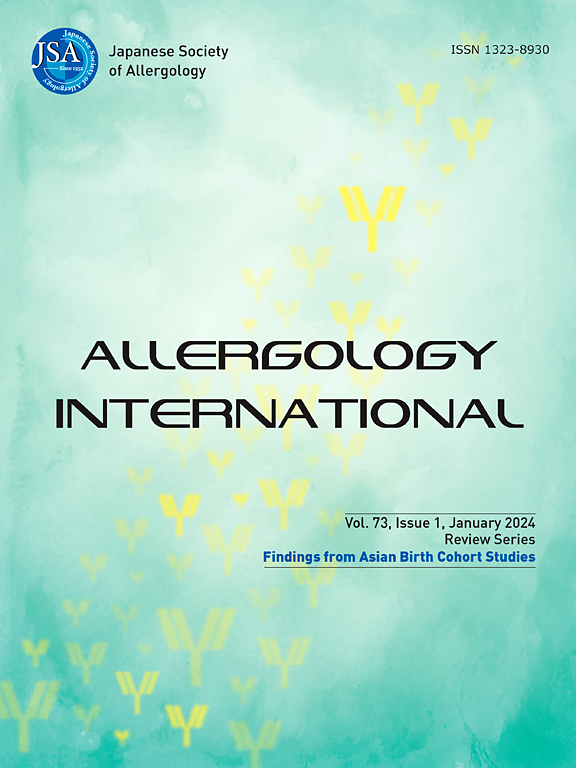Effectiveness of benralizumab in the Tokyo Asthma Study (TOAST): A real-world prospective interventional trial
IF 6.7
2区 医学
Q1 ALLERGY
引用次数: 0
Abstract
Background
Biologics are integral in the management of severe asthma. As the effectiveness of the anti-IL-5 receptor antibody benralizumab in Japan remains elusive, this study aimed to assess its real-world effectiveness in Japanese patients with severe asthma.
Methods
This prospective, interventional, single-arm clinical trial was conducted across ten facilities in Japan between September 2020 and July 2022. Adult patients with severe eosinophilic asthma (peripheral blood eosinophil count ≥150 cells/μl) were enrolled and treated with benralizumab. The primary endpoint was the change in ACQ-5 score from baseline to week 24.
Results
Of 103 patients, 98 (mean age: 62.1 years, women: 55.1 %, regular oral corticosteroids [OCS] treatment: 20.4 %) were included in the analysis. From baseline to week 24, benralizumab significantly improved ACQ-5 (−0.67, 95 % CI: −0.94 to −0.39) and AQLQ (0.71, 95 % CI: 0.46 to 0.96) scores with an increase in FEV1 (87 ml, 95 % CI: 15–159 ml). The maintenance OCS dose and the percentage of OCS users decreased from 13.9 mg/day to 6.0 mg/day and from 20.4 % to 9.2 %, respectively. Multivariable analysis identified baseline blood eosinophil count (≥400 cells/μl) and fractional exhaled nitric oxide (≥22 ppb) as independent predictors of therapeutic response to benralizumab. Benralizumab treatment was discontinued due to nonserious adverse events and patient choice in four and three patients, respectively.
Conclusions
In a real-world setting in Japan, patients with severe eosinophilic asthma treated with benralizumab demonstrated substantial improvements in asthma control, quality of life, and respiratory function with reduced OCS usage. Trial registration: Japan Registry of Clinical Trials (jRCTs031190237).
benralizumab在东京哮喘研究(TOAST)中的有效性:一项现实世界的前瞻性介入试验。
背景:生物制剂在严重哮喘的治疗中是不可或缺的。由于抗il -5受体抗体benralizumab在日本的有效性仍然难以捉摸,本研究旨在评估其在日本严重哮喘患者中的实际有效性。方法:这项前瞻性、介入性、单臂临床试验于2020年9月至2022年7月在日本的10家医院进行。纳入严重嗜酸性粒细胞哮喘(外周血嗜酸性粒细胞计数≥150细胞/μl)的成年患者,并使用贝那利珠单抗治疗。主要终点是ACQ-5评分从基线到第24周的变化。结果:103例患者中,98例(平均年龄:62.1岁,女性:55.1%,常规口服皮质类固醇治疗:20.4%)纳入分析。从基线到第24周,benralizumab显著改善ACQ-5 (-0.67, 95% CI: -0.94至-0.39)和AQLQ (0.71, 95% CI: 0.46至0.96)评分,FEV1增加(87 ml, 95% CI: 15-159 ml)。OCS维持剂量和OCS使用者的百分比分别从13.9 mg/天下降到6.0 mg/天,从20.4%下降到9.2%。多变量分析确定基线血嗜酸性粒细胞计数(≥400细胞/μl)和呼气一氧化氮分数(≥22 ppb)是对贝纳利珠单抗治疗反应的独立预测因子。由于非严重不良事件和患者选择,分别有4例和3例患者停止了Benralizumab治疗。结论:在日本的现实环境中,使用benralizumab治疗的严重嗜酸性哮喘患者在哮喘控制、生活质量和呼吸功能方面表现出显著改善,同时减少了OCS的使用。试验注册:日本临床试验注册中心(jRCTs031190237)。
本文章由计算机程序翻译,如有差异,请以英文原文为准。
求助全文
约1分钟内获得全文
求助全文
来源期刊

Allergology International
ALLERGY-IMMUNOLOGY
CiteScore
12.60
自引率
5.90%
发文量
96
审稿时长
29 weeks
期刊介绍:
Allergology International is the official journal of the Japanese Society of Allergology and publishes original papers dealing with the etiology, diagnosis and treatment of allergic and related diseases. Papers may include the study of methods of controlling allergic reactions, human and animal models of hypersensitivity and other aspects of basic and applied clinical allergy in its broadest sense.
The Journal aims to encourage the international exchange of results and encourages authors from all countries to submit papers in the following three categories: Original Articles, Review Articles, and Letters to the Editor.
 求助内容:
求助内容: 应助结果提醒方式:
应助结果提醒方式:


